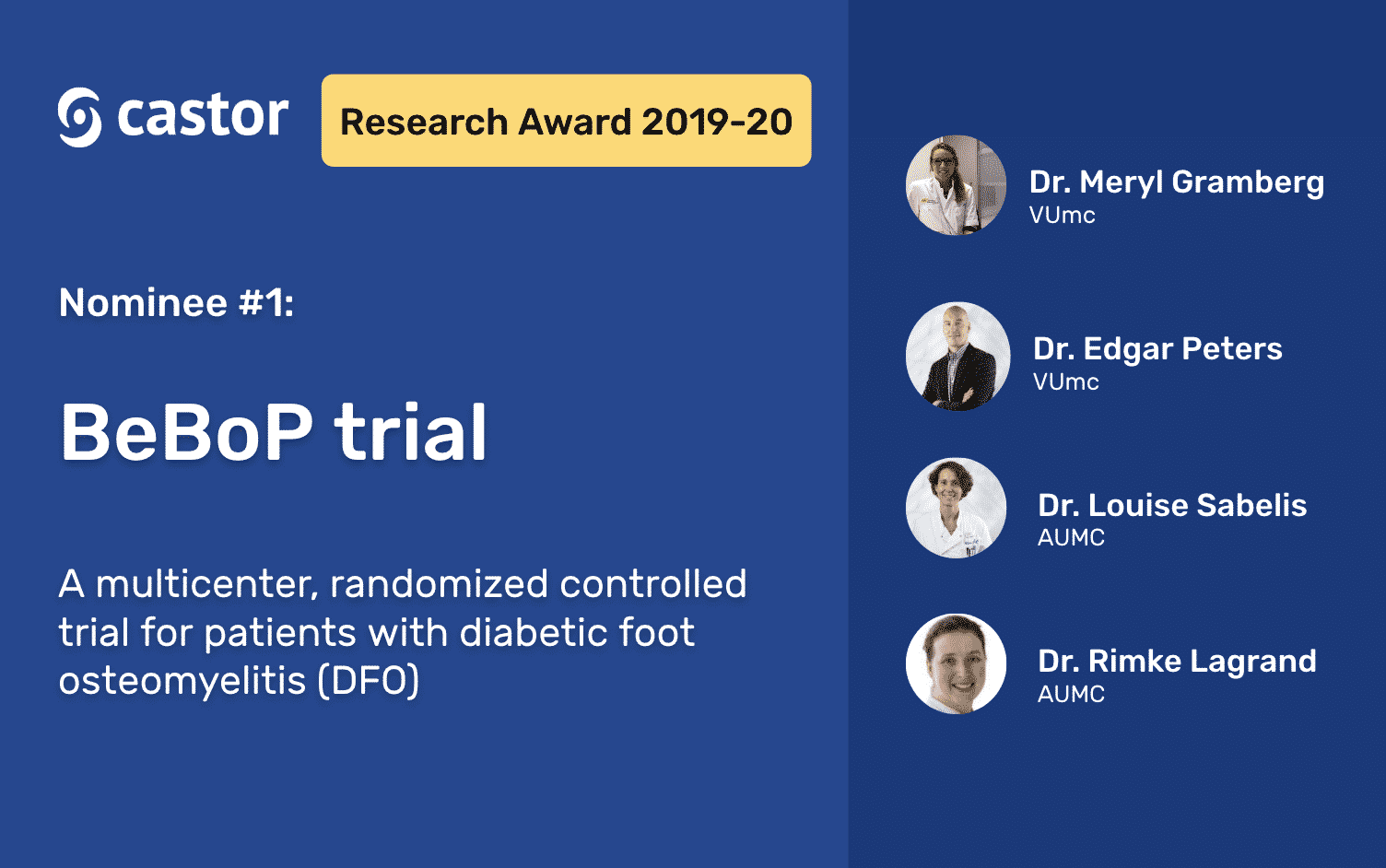Our customers are constantly striving to make the world a healthier place with their innovative research. At last year’s Castor Research Award, we celebrated researchers who are finding ways to reduce intravenous antibiotics in neonates, studying mobile health for Grown-Up Congenital Heart Disease, investigating the postoperative outcomes of lower gastrointestinal surgery, and more.
We want to continue to celebrate our community of researchers who are driving innovation in medicine around the world. The 2019-20 Castor Research Award is going to be bigger than ever and we are excited to announce the first nominee. The BeBop Trial is a multicenter, randomized controlled trial for patients with diabetes and osteomyelitis (infection in the bone) of the foot.

Research Overview
The BeBoP (from ‘BonE BiOPsy’) trial aims to determine the causative agent and optimal duration of antibiotic treatment for patients with diabetes and foot osteomyelitis. Currently, a bone biopsy is considered the gold standard for diagnosing the cause of diabetic foot osteomyelitis (DFO). But in clinical practice, the diagnosis tends to be based on a deep wound specimen because of potential complications or logistical problems associated with a bone biopsy.
The team behind the BeBoP trial is comparing the treatment outcomes of the patients treated with antibiotics based on culture results from bone biopsies and deep wound specimens. They also aim to identify the optimum treatment duration, the role of imaging (PET/CT and MRI), and track repeated microbiology results. The BeBoP trial will gather a vast amount of data over a length of time, include 80 participants, and perform both objective and subjective assessments of the participants’ Quality of Life.
Research Team
Dr. Meryl Gramberg, the coordinating researcher, is a Ph.D. student at the Department of Infectious Diseases and Rehabilitation Medicine at Amsterdam UMC. With a background in internal medicine, she took a break from post-registration medical training to pursue her doctorate and gain expertise in the field of infectious diseases. The team also includes Dr. Edgar Peters (Primary Investigator and specialist in acute medicine and infectious disease), Dr. Louise Sabelis (Rehabilitation Specialist), and Dr. Rimke Lagrand (Ph.D. student).
Study design and Methodology
The BeBoP trial is a multicenter randomized controlled trial (RCT) that includes 80 patients. The data collected will include bone biopsies, deep wound specimens, blood to ascertain inflammatory markers, and X-rays of the feet.
The patients will be randomized equally into two treatment branches based on the results of the deep wound culture and bone biopsy. The result of the culture will be blind to the investigators, clinicians, and patients. The follow-ups occur after 6 and 12 months during which patients will receive both Quality of Life and clinical assessment surveys & questionnaires for patient-reported outcome measures.
The observational branch of the study involves 40 patients who will be randomized again and then treated for either 3 or 6 weeks with antibiotics. After the course of treatment, bone biopsies and PET/CT scan will be repeated. The antibiotic treatment can be continued or ended based on these results. These patients will have rectal swabs taken before starting treatment and at the follow-up appointments to study the fecal microbiome with 16S DNA sequencing and ISpro (molecular techniques to study bacterial DNA).
Research Outcome
The BeBoP trial is measuring patients for the remission of DFO. The outcomes will help determine an optimal empiric duration of antibiotic treatment for DFO based on the results of imaging, inflammatory biomarkers, and repeated bone biopsies. This study also aims to evaluate whether imaging, blood tests, and cultures (including molecular techniques) can predict clinical remission of osteomyelitis after cessation of therapy at 6 and 12 months. Overall, the trial will attempt to compare microbiological data in bone biopsy specimens and deep wound specimens and use this data to inform future treatment. The BeBoP team is also assessing the changes in fecal and wound microbiome related to antibiotic treatment.
How is the BeBoP trial team using Castor EDC?
A Castor record ID is created for every patient included in the trial, making it extremely simple to randomize patients into two groups based on the inclusion criteria. Quality of Life surveys are automatically sent to the patients throughout the study using Castor ePRO.
Apart from being a centralized platform for both data capture and patient engagement, Castor EDC also operates as a repository for all study data including information about antibiotics use and pathology results. Castor EDC automatically creates immutable audit trails and ensures adherence to Good Clinical Practice guidelines and data privacy regulations. They are also testing the Castor-Epic EHR integration to seamlessly upload laboratory results captured at Amsterdam UMC directly into the database in Castor EDC.
The BeBoP team particularly noted that it was much easier to conduct Electronic Data Capture (EDC) in their clinical trial research on Castor because of its robust study building features, flexible eCRF construction, unlimited data fields and validations, and the ability to integrate patient data under a single record. Castor has also enabled the team to work with other medical centers around the world with granular user-right management, ensuring a smooth, safe, and valid clinical trial.
